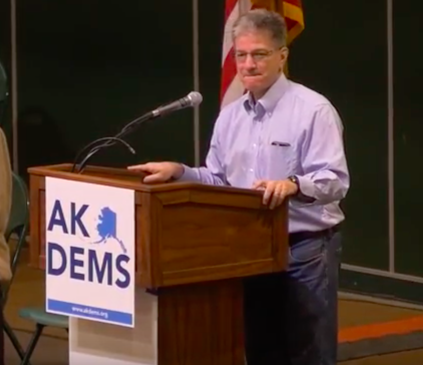By MAE MARSH
“When…” asked the crisis management consultant, “are you going to address your culture of failure and cover-up?”
That question was asked back in 2015 when UA (specifically UAF) went public with the Title IX crisis.
The crisis was preceded by the LARS federal fine of $127,000 in the die-off of 12 musk oxen, and by the crisis involving an injection of an unauthorized solution in the medical assistant program.
More recent, UA crisis management includes the loss of the UAA education program accreditation when it was clear three years prior that the changes were essential, and the federal lawsuit based on sexual harassment in the UAA archaeology program.
Now UA is in yet another crisis – the budget crisis. The question at hand…is this a crisis or just another example of an organizational culture that has an inability to listen, to see, and to take calculated risks to address gaps before they create failure and another crisis to manage.
So, I am taking this opportunity to uncover a UA fundamental issue and make a recommendation.
I am a retired federal civil servant. I had a 27-year career with the federal government, serving in Maryland, Washington, Germany, The Netherlands, and for Alaska, I was a Budget Analyst, a Program Analyst, and the Equal Employment Opportunity (EEO) Manager for Forts Wainwright, Greely, and Richardson. My last assignment with the feds was in Virginia as a GS-14 Deputy Director of Equal Opportunity at the agency level. I have served as an advisor to top leaders and know sound leadership when I see it. After retiring, I returned home to Fairbanks when I was selected to serve as the UAF Director of Diversity & Equal Opportunity and their Title IX Coordinator.
In my professional opinion, the glaring issue for UA is lack of leadership.
It is common knowledge that oil revenues are down. We have known that for quite a while. In order to keep afloat, just like the federal government “changed the color” of our social security contributions and used those funds to pay for government, under the Walker administration our Alaskan Legislators “changed the color” of PFD money and used it to fund our state government. Now we are questioning that tactic.
Even if the Dunleavy line items vetos are reversed and we use the PFD funds towards government rather than for their original purpose – we have to ask, is that wise, legal, ethical, and sustainable? I understand that every dollar spent by the state is important to someone – the young, the homeless, the employee, the student – but can we sustain our current level of spending?
I am disappointed with UA President Jim Johnsen’s response to the reductions. Johnsen referred to the $135 million funding reduction as “draconian cuts” thus indicating the reduction is harsh, severe, or too restrictive. Further, he engaged in cantankerous behavior by prompting employees, students, and citizens to contact legislative representatives demanding the reinstatement of the funding.
Johnsen responded with angst and victimhood rather than leadership.
While employed at UA, I went to Johnsen with a sound strategy to get into Title IX compliance prior to the finalization of the federal review. Johnsen dismissed me and implanted an individual that was not trained in Title IX to be his direct advisor. Johnsen did not hear me, he did not close the gaps, and he did not guide the institution to compliance. Ultimately, it took the 2017 federal settlement agreement, which mirrored my 2014 plan, before UA finally complied.
The pending $135 million reduction is an excellent example of leadership not hearing and not responding with courageous action. Yes, this reduction may be unprecedented, however, it ultimately puts Alaska more in alignment with the level of support provided by states across the country. The average state support to a university is 25% but according to Moody’s Investor’s Service, in 2015 UA was receiving 50 percent. That’s double the national average.
On June 4, 2015, a warning shot was fired over UA’s bow when Moody’s revised the UA credit rating outlook to ‘negative’ stating:
“The outlook revision to negative is based on University of Alaska’s (UA) high reliance on the State of Alaska (Aaa negative) for operating and capital support, with expected increased pressure on university operations as the state copes with lower revenues from the oil production and moderates funding.”
The inability to sustain the high level of funding to UA is and has been a well-known fact and the reductions have been looming since 2015. UA’s high reliance on the state ultimately weakens their credit rating and if the reductions are not implemented this year, they will continue to haunt the institution. More state money is not the answer. Sound leadership is needed and the message is clear: UA can come out of this a stronger institution by reducing their dependence on the state.
During my tenure between 2012 and 2016, almost annually, plans were developed to implement reductions. Some became a reality and some were shelved. Planning for program reductions are complicated by the lead time necessary to take care of currently enrolled students. I only hope UA has been proactive in taking the forward-thinking steps necessary to care for students and that they stand ready to take the reductions, if not this year, then next year. It will be painful but there will also be benefits.
Which brings me back to my opening thesis regarding the UA culture.
The UA culture was described as a “culture of failure and cover-up” by their crisis management consultant. He asked why UA was constantly in crisis management, why they go from crisis to crisis and fail to address the root cause.
I have an observation to share. In my professional opinion, the root cause and the biggest impediment to improving the culture and subsequently improving leadership within the UA system is the overreaching power and authority of their General Counsel.
The fact that the General Counsel has overreaching tentacles down into the organization was affirmed to me when GC hired an attorney to investigate Title IX failures. The investigator told me organizational lawyers typically provide advice and then leadership decides if they will or will not follow the advice – which is not the case for UA. That was also my experience working for the federal government – the lawyers are legal advisors and do not direct. However, in the UA system, to question, to oppose, or to not follow General Counsel’s “advice” is a career death sentence. Survival in the UA system requires acquiescence to the General Counsel’s power and control.
Individuals who do not follow the dictates of General Counsel are discredited, marginalized, and pushed out. I saw an Associate General Counsel lie to the Board of Regents to dishonor a chancellor, apply pressure, and eventually constructively discharge him. I saw a coworker who voiced discrimination by stating that decisions were “falling out on gender lines” called a “terrorist” by an Associate General Counsel.
When called out on the inappropriateness of his labeling and name-calling, he revised his statement and claimed he said the coworker’s behavior was “terrorist-like”. This coworker was also subsequently ‘moved on’.
As UAF’s Title IX Coordinator, I also experienced the General Counsel’s wrath. Federal guidance states, “The Title IX coordinator’s role should be independent to avoid any potential conflicts of interest” and further identifies, “designating a disciplinary board member, general counsel, dean of students, superintendent, principal, or athletics director as the Title IX coordinator may pose a conflict of interest.” (bold print added by me).
At UA, Title IX authority was usurped and the AGC became the self-appointed “Title IX Czar”. I pushed back and my chancellor warned me to expect a “counter-attack.” Below are a few tactics that ensued. The General Counsel’s office…
- Threatened to go to the BOR and report that UAF didn’t have a “viable program” when UAF questioned the General Counsel’s guidance.
- Interfered in investigations and the campus sanctioning process.
- Made calls to supervisors and applied pressure when directors pushed back or questioned the General Counsel’s interference.
- Perpetuated a falsehood that UAF Title IX didn’t talk to or keep the General Counsel informed.
- Removed cases from UAF and gave them to other campuses to order to maintain control.In one case, UAF was pressured to complete a report over a three-day weekend because the General Counsel said it was urgent. The case was subsequently moved to another campus where they were allowed months to finalize the case.
- Drug their feet on updating policy.
- Created disruption and conflict by providing different and opposing advice to UAF staff members.
- Conscripted the newly arrived interim chancellor by labeling UAF Title IX as “uncooperative” and “resistant” before he had a chance to meet the team or review the program.
- Heightened scrutiny and put UAF on the front line of publically confessing failures while the other campuses also had failures but were not compelled to go public.
- Referred to UAF’s fact-based reports as “a creative work of fiction”.
- Overused, abused and hid behind attorney-client privilege. At the previously mentioned crisis management meeting, the UA’s Associate General Counsel explained attorney-client privilege and the consultant rolled his eyes and responded, “That’s the first time I’ve ever heard it explained like that.”
- Violated my rights by refusing to give permission for a Department of Education investigator to interview me without the Associate General Counsel’s presence. The Associate General Counsel claimed I was his client and justified the interference with the pretext that he had to oversee the interview to ensure I provided “accurate and truthful answers” and because he had to be present to “deal with legal issues such as privilege.” The preceding months I was put in public as the Title IX face of failure and had successfully provided “accurate and truthful answers” during the public disclosure and had maintained their “privilege”. Ultimately, the issue of Associate General Counsel’s presence in my interview was pushed up through the federal legal channels and the interview was later conducted without the Associate General Counsel’s presence.
What I have been exploring are the larger, more public failures but the culture starts with small failures that are not corrected and put on the right path.
It starts with things like not holding non-performers accountable because of fear of a lawsuit, like appointing untrained individuals to critical roles, like continuing a program that has not graduated a student in six years, like athletic leadership taking off to a conference in Florida following a report of a Title IX violation and leaving a stunned and traumatized team unaided. Or like asking why Title IX couldn’t just tell the feds that UA couldn’t get into compliance due to budget constraints when the feds contribute millions of dollars annually to the institution. Or the Associate General Counsel placating an unruly professor by buying the professor a beer and subsequently the professor was set up to deliver a Title IX presentation to the Board of Regents, an opportunity not afforded to the coordinators with the responsibility for Title IX.
These are only some of the small failures that are not addressed due to the risk-averse and retaliatory environment.
The bottom line is that the General Counsel’s interloping is damaging to the UA culture and a major contributor in failures. Their overreach hinders appropriate action, creates adversarial relationships, and strangles progress. It results in corruption and violation of a basic organizational management principle – having defined roles.
The defined role of the General Counsel is to be an adviser, to dig into detail, to warn of legal risk, and to protect the institution using adversarial tactics to win. To reduce costs, some universities contract with one local legal firm to provide as-needed services, therefore, they do not have the expense of maintaining their own legal staff and they do not have issues of interference.
At UA, not only does the General Counsel’s encroachment harm the university, it also impacts off-campus Because the General Counsel mismanages their time, they end up farming-out work to the state’s best lawyers and legal firms for a fee – which increases costs. This practice, ultimately limits legal representation to individuals that believe they have been harmed by UA. The state’s best lawyers serve UA and it would be a conflict of interest for them to take a UA employee or student as a client.
The defined role of a leader is to build the vision, take calculated risk, and to collaborate and build strong teams to win. Leaders are the ones that conduct business, solve problems, make decisions, and manage change. With the UA culture of GC usurping leader’s rights and roles, there is a resulting culture of fear, indecision, and ultimately, failure and cover-up.
I believe in education and agree that Alaska needs a strong university. But to build UA Strong, it will take more than state money added to their budget. It will take a restructure of power, as well as, a fundamental change in who leads and how they lead. That change must include taking the reins out of the hands of General Counsel and giving the reins back to leaders.
UA Strong!
Mae Marsh is the former UAF director of Diversity & Equal Opportunity, and Title IX coordinator.










